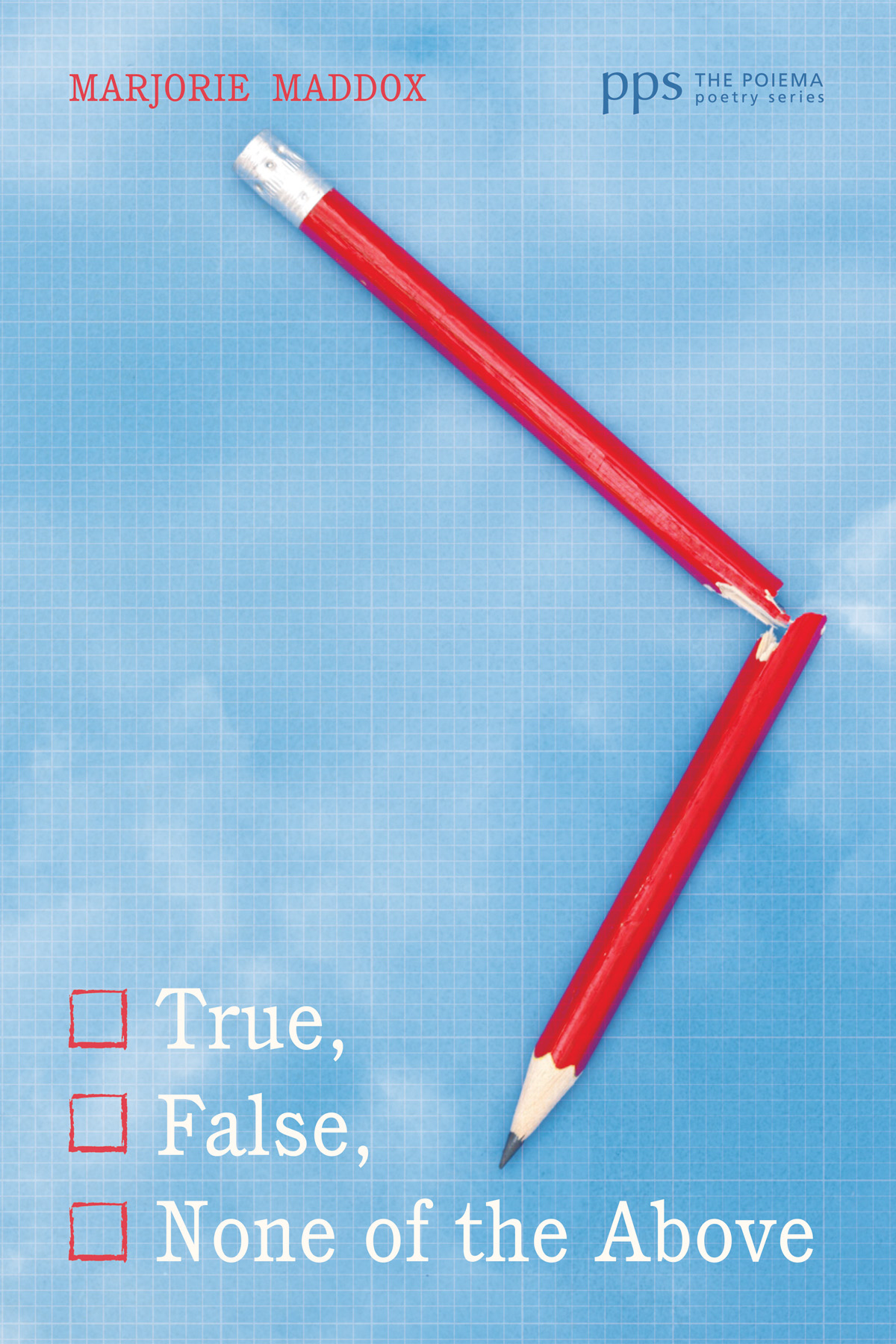True, False, None of the Above poetically explores how books mark and mirror our lives and what it means to write, read, and teach literature in a world that—at turns—rejects, embraces, or shrugs indifferently at the spiritual.
What People Are Saying about True, False, None of the Above
“In True, False, None of the Above, Maddox offers us a brilliant, witty, and vulnerable garland of poems. Here is the voice of a teacher, a poet, a mother and wife, a woman of faith bearing witness to a deep and lasting Truth, summoning—among others—the likes of Dante, Hopkins, Dickinson, Eliot, and Frost, each calling out to the other, often at scintillant crosspurposes,
all set choiring to this magisterial teacher’s gentle bidding.” PAUL MARIANI, University Professor of English, Boston College; author of God and the Imagination: On Poets, Poetry, and the Ineffable
“In the preface to her book True, False, None of the Above, Maddox describes the experience of literature—whether reading, teaching, or creating it—as a ‘confrontation with reality.’ And her poems indeed confront a range of uneasy truths, from adultery and natural disasters to tooth extraction and raising teens. Maddox builds on the shared imagination of writers and readers, richly and deftly, to deepen and challenge our spirits.” TANIA RUNYAN, author of Second Sky
“In some of these poems, Marjorie Maddox riffs on the poetry of other writers. Sometimes she sings like an angel, even about illness and death. She wields forms brilliantly, and she tells delicious stories about what goes on in her classroom. Everybody who relishes good poetry should buy this book. But if you’re a teacher—or if you’ve ever sat in a classroom anywhere—True, False, None of the Above will make you laugh out loud.”
JEANNE MURRAY WALKER, Professor of English, University of Delaware; coeditor of Shadow & Light: Literature and the Life of Faith
Publisher’s Information
- PUBLISHER: Cascade Books, Poeima Poetry Series
- ISBN: 978-1-4982-3922-6
- DIMENSIONS: 6 x 9
- PAGES: 104]
- PRICE: $14.00
- RELEASE DATE: 04/07/2016
- PURCHASE HERE
Recommended Works by Marjorie Maddox
Les Fauves by Barbara Crooker
Les Fauves is, as the title suggests, a collection of ekphrastic poetry, meditations on paintings from the Fauve and Post-Impressionist movements. But it also contains poetry’s equivalent to Fauvism, poems that take a walk on the wild side. There are language experiment poems, poems of word play, poems in form both usual (end rhymes, sonnets, ghazals) and unusual (abecedaries, traditional, embedded, and double helix), palindromes, anagrams, and word scrambles. Crazy word salad poems. Crooker’s subjects range widely, from living and working in a small village in the South of France, love in a long-term relationship, food as more than sustenance, faith in a secular age, grammar and usage, the pains and pleasures of the aging body. But always, what engages her most is what it means to be human on this fragile planet, at this time in our troubled history, still believing that “Beauty will save the world.” (Fyodor Dostoevsky). READ MORE
Winterkill by Todd Davis
In Winterkill, Todd Davis, who, according to Gray’s Sporting Journal, “observes nature in the great tradition of Robert Frost, James Dickey, and Jim Harrison,” offers an unflinching portrait of the cycles of birth and death in the woods and streams of Pennsylvania, while never leaving behind the tragedies and joys of the human world. Fusing narrative and lyrical impulses, in his fifth book of poetry Davis seeks to address the living world through a lens of transformation. In poems of praise and sorrow that draw upon the classical Chinese rivers-and-mountains tradition, Davis chronicles the creatures of forest and sky, of streams and lakes, moving through cycles of fecundity and lack, paying witness to the fundamental processes of the earth that offer the possibility of regeneration, even resurrection. Meditations on subjects from native brook trout to the ants that scramble up a compost pile; from a young diabetic girl burning trash in a barrel to a neighbor’s denial of global warming; from an examination of the bone structure in a rabbit’s skull to a depiction of a boy who can name every bird by its far-off song, these are poems that both celebrate and lament the perfectly imperfect world that sustains us. READ MORE
Discussion Questions for True, False, None of the Above
1. 1. In the book’s preface, Maddox talks about literature as a confrontation with rather than as an escape from reality. Where, in the poems, do you see evidence of this? What examples do you see where literature helps us confront our day-to-day lives? In what ways does the cover image help convey these ideas?
2. 2. Which poems show us the perspective of a student? Of a teacher? Of a writer? Where do such perspectives merge or overlap? What do such perspectives say about the process of reading or writing? About how we define “literature”?
3. 3. Where and in what ways does Maddox use humor? What effect does humor have on the overall collection?
About Marjorie Maddox
Sage Graduate Fellow of Cornell University (MFA) and Professor of English and Creative Writing at Lock Haven University, Marjorie Maddox has published eleven collections of poetry—including True, False, None of the Above; Local News from Someplace Else; Wives’ Tales; Transplant, Transport, Transubstantiation; and Perpendicular As I —the short story collection What She Was Saying (March 2017 Fomite Press), and over 500 stories, essays, and poems in journals and anthologies. Co-editor of Common Wealth: Contemporary Poets on Pennsylvania, she also has published four children’s books. For more information, please see www.marjoriemaddox.com
Do You Have a Book Launching? Submit Your Book to The Eckleburg Book Club…
[leaky_paywall_register_form]
True, False, None of the Above poetically explores how books mark and mirror our lives and what it means to write, read, and teach literature in a world that—at turns—rejects, embraces, or shrugs indifferently at the spiritual.



